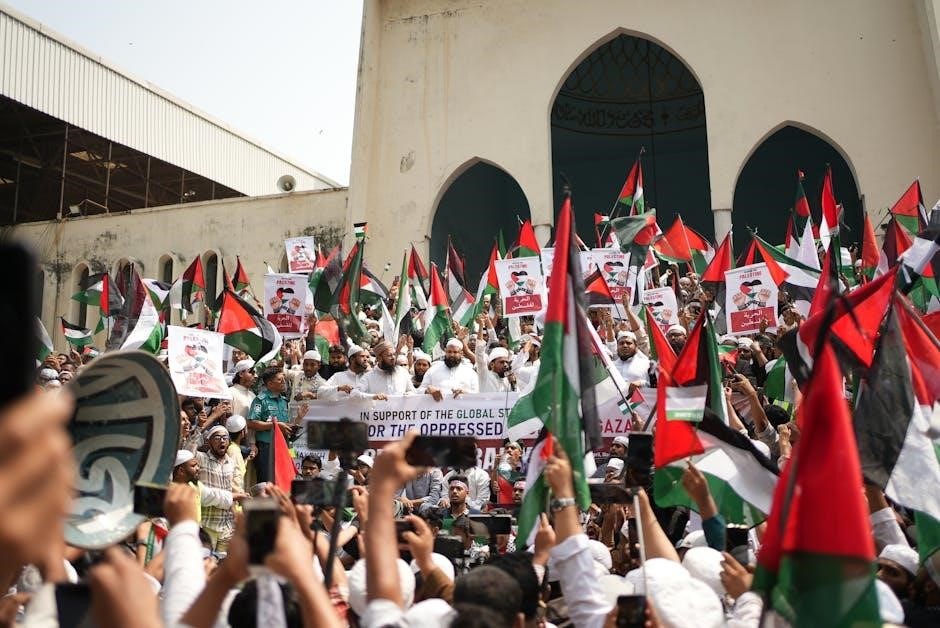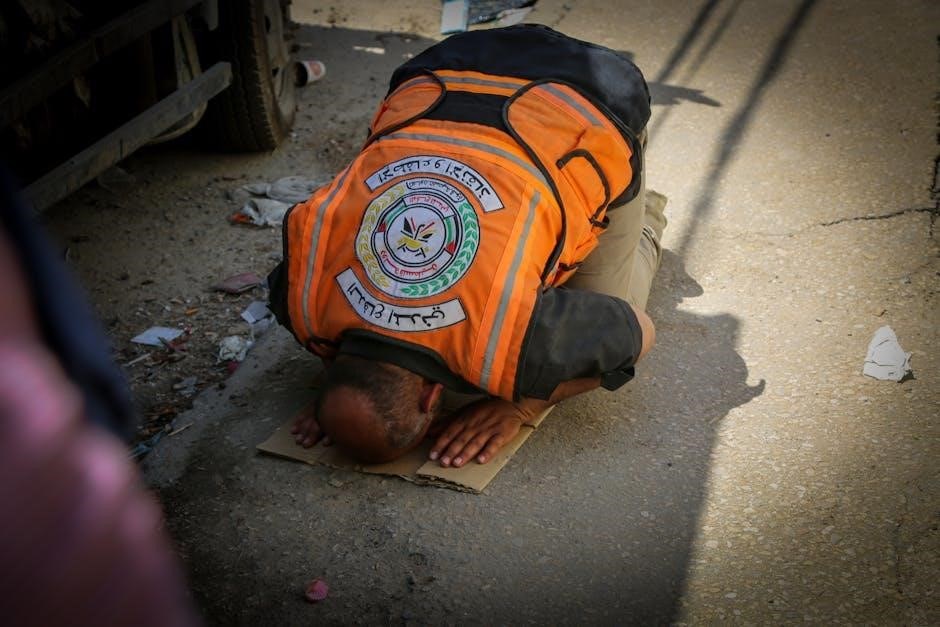Rashid Khalidi’s The Hundred Years War on Palestine offers a comprehensive analysis of the 1917-2017 conflict, exploring settler colonialism and resistance through personal and archival sources.
Overview of the Book and Its Author
Rashid Khalidi, a renowned historian and professor of modern Arab studies at Columbia University, authored The Hundred Years War on Palestine. This book provides a detailed account of the Israel-Palestine conflict, spanning from 1917 to 2017. Khalidi, a descendant of a prominent Palestinian family, combines academic research with personal insights, offering a unique perspective on the struggle. The book explores the roots of the conflict, tracing it back to Zionist settler colonialism and British involvement. It also examines key events, such as the 1948 war and the Oslo Accords, while highlighting Palestinian resistance. Khalidi’s work is praised for its thorough analysis and use of untapped archival materials, making it a significant contribution to understanding the region’s history.
Significance of the Title: “The Hundred Years War on Palestine”
The title The Hundred Years War on Palestine underscores the prolonged and complex nature of the Israel-Palestine conflict, drawing parallels to Europe’s Hundred Years’ War. It highlights the century-long struggle against settler colonialism, emphasizing the historical depth of Palestinian displacement and resistance. The phrase “war on Palestine” reflects the book’s focus on the systemic oppression and violence faced by Palestinians. By framing the conflict as a “hundred years war,” Khalidi conveys its cyclical and enduring nature, inviting readers to view it through the lens of colonialism rather than merely a territorial dispute. The title’s significance lies in its ability to encapsulate the book’s central thesis and provoke deeper reflection on the conflict’s historical and ongoing dimensions.
Rashid Khalidi’s Approach to the Conflict
Rashid Khalidi’s approach to the Israel-Palestine conflict in The Hundred Years War on Palestine is deeply interdisciplinary, blending historical analysis with personal and familial insights. Drawing on untapped archival materials, including records from his own family, Khalidi provides a nuanced narrative that situates the conflict within the framework of settler colonialism. His approach emphasizes the agency of Palestinians, often overlooked in dominant narratives, and highlights their resistance and resilience. By integrating academic rigor with personal histories, Khalidi offers a comprehensive understanding of the conflict’s historical roots and its ongoing impact. His method bridges the gap between scholarship and lived experience, making the book both academically robust and emotionally resonant.
Historical Context of the Israel-Palestine Conflict
The conflict traces its roots to the late 19th century, with Zionism’s rise and British involvement, culminating in the 1917 Balfour Declaration, shaping a century of displacement and resistance.
Origins of the Conflict: Zionism and Settler Colonialism
Zionism emerged in the late 19th century, advocating for a Jewish homeland in Palestine, then under Ottoman rule. The 1917 Balfour Declaration, issued by the British Empire, endorsed this vision, sparking tensions with the indigenous Palestinian population. Rashid Khalidi’s book highlights how Zionist settlers, supported by colonial powers, implemented policies of displacement and land confiscation, laying the groundwork for a century of conflict. This settler colonialism sought to establish a Jewish state, often at the expense of Palestinian rights and self-determination. The interplay of Zionist ambitions and colonial backing created a legacy of dispossession and resistance, shaping the modern Israel-Palestine conflict.
The Role of the British Empire and the Balfour Declaration
The British Empire played a pivotal role in shaping the Israel-Palestine conflict through the 1917 Balfour Declaration, which endorsed the establishment of a Jewish homeland in Palestine. This declaration, issued during World War I, reflected British imperial ambitions in the region. It promised Zionist leaders support for their aspirations while disregarding the rights of the indigenous Palestinian population. The Balfour Declaration became a cornerstone of British policy during the Mandatory period, facilitating Jewish immigration and land acquisition. This led to growing tensions with Palestinians, who viewed it as a threat to their sovereignty. Khalidi’s book underscores how British support for Zionism laid the foundation for a century of conflict, displacing Palestinians and fostering a legacy of resistance. The declaration remains a contested symbol of colonial intervention in the region.
The Mandatory Period and Its Impact on Palestine
The British Mandatory period (1920–1948) profoundly shaped Palestine’s trajectory, institutionalizing Zionist expansion and Palestinian dispossession. British policies facilitated Jewish immigration and land acquisition, intensifying tensions over resource control. The Mandate’s framework entrenched economic disparities, as Palestinians faced marginalization in employment and land ownership. Cultural and political tensions escalated, with Zionist institutions gaining strength while Palestinian leadership struggled for cohesion. The British administration’s repression of Palestinian uprisings, such as the 1936–1939 revolt, further polarized the population. By the Mandate’s end, the seeds of conflict were deeply planted, leading to the 1948 war and the displacement of hundreds of thousands of Palestinians. Khalidi’s analysis highlights how this period laid the groundwork for ongoing instability and resistance in Palestine. The Mandate’s legacy remains central to understanding the enduring conflict.

Key Events of the Hundred Years’ War
The 1948 War established Israel, displacing Palestinians and shaping the conflict’s trajectory. The 1967 Six-Day War expanded Israeli control, while the First Intifada and Oslo Accords marked shifting dynamics between violence and diplomacy.
The 1948 War and the Establishment of Israel
The 1948 War marked the establishment of Israel, leading to the displacement of hundreds of thousands of Palestinians, known as the Nakba or “catastrophe.” This conflict arose from the termination of the British Mandate and the UN Partition Plan, resulting in the creation of Israel and the subsequent Arab-Israeli War. The war redrew the region’s map, leaving deep divisions and geopolitical tensions. It led to the expulsion of over 700,000 Palestinians, creating a long-standing refugee crisis. The consequences of 1948 continue to shape the Israel-Palestine conflict, with issues of displacement, occupation, and statehood remaining unresolved. Khalidi’s analysis sheds light on the war’s impact through personal accounts and archival records, providing a detailed historical perspective.
The 1967 Six-Day War and Its Consequences
The 1967 Six-Day War was a pivotal event in the Israel-Palestine conflict, resulting in Israel’s occupation of the West Bank, Gaza Strip, and East Jerusalem. This war expanded Israeli control over Palestinian territories, leading to prolonged military occupation and the displacement of thousands. The conquest of these lands intensified settler colonialism, with Israel establishing settlements that remain a major obstacle to peace. The war also exacerbated Palestinian resistance, as displacement and restricted autonomy fueled ongoing struggles. Khalidi’s analysis highlights how the 1967 war reshaped the conflict’s dynamics, deepening geopolitical tensions and complicating efforts toward a resolution. The consequences of this war continue to influence the modern landscape of the Israel-Palestine conflict.
The First Intifada and the Oslo Accords
The First Intifada (1987–1993) marked a turning point in Palestinian resistance, characterized by mass protests, strikes, and armed struggle against Israeli occupation. This period highlighted the resilience of Palestinians under prolonged military rule. The Intifada’s impact led to the Oslo Accords (1993), a historic attempt at peace negotiations. The Accords aimed to establish limited Palestinian self-governance and a framework for resolving core issues like borders and settlements. However, the agreements ultimately fell short, as Israel continued to expand settlements, fragmenting Palestinian land. Khalidi’s analysis critiques the Accords’ failure to address root causes of the conflict, such as displacement and occupation, leaving the peace process in limbo. This period remains central to understanding the conflict’s unresolved tensions.

Settler Colonialism and Resistance
Khalidi examines the century-long struggle against settler colonialism in Palestine, highlighting indigenous resistance to Zionist expansion and Israeli occupation, drawing from archival and personal insights.
Defining Settler Colonialism in the Palestinian Context
Settler colonialism in Palestine refers to the displacement of the indigenous population by a foreign settler movement, notably Zionism, which sought to establish a Jewish homeland. This form of colonialism differs from traditional colonialism, as its goal is not exploitation but the replacement of the native population. Khalidi explores how Zionist settlers, later Israel, implemented policies to displace Palestinians, erase their identity, and claim the land as their own. The process involved land confiscation, military occupation, and cultural suppression, creating a unique and enduring conflict. Palestinian resistance, from armed struggle to diplomacy, has consistently challenged this colonial project, drawing international solidarity and highlighting the fight for self-determination.
Forms of Palestinian Resistance: Armed Struggle and Diplomacy
Palestinian resistance has evolved over the decades, encompassing both armed struggle and diplomatic efforts. Armed resistance, including groups like the PLO and Hamas, has historically been a means to challenge Israeli occupation and assert Palestinian rights. Diplomacy, exemplified by the Oslo Accords and appeals to international bodies, seeks to negotiate statehood and recognition. Both approaches have faced significant challenges, with armed struggle often leading to harsh repression and diplomacy yielding limited results. Despite these obstacles, Palestinians continue to employ diverse strategies to confront settler colonialism and advocate for self-determination. Khalidi’s work highlights the complexity and resilience of these resistance forms, emphasizing their historical and contemporary relevance in the struggle for Palestinian liberation and justice.
The Role of International Support and Solidarity
International support and solidarity have played a pivotal role in the Palestinian struggle, shaping global perceptions and influencing policies. Various movements worldwide advocate for Palestinian rights, emphasizing justice and self-determination. The book highlights how solidarity efforts, including boycott campaigns and awareness initiatives, have pressured Israel and its allies. International bodies like the UN have provided platforms for Palestinian voices, though their impact is often limited by geopolitical dynamics. Grassroots activism and academic engagement have also amplified Palestinian narratives, fostering empathy and understanding. Khalidi underscores the importance of global solidarity in countering settler colonialism and supporting Palestinian resistance, illustrating how international empathy can contribute to a more equitable resolution of the conflict.

The Impact of the Conflict on Palestinians
The conflict has caused profound displacement, occupation, and economic hardship for Palestinians, deeply affecting their daily lives and cultural identity over generations.
Displacement and the Refugee Crisis
The displacement of Palestinians has been a defining feature of the conflict, with the 1948 Nakba (catastrophe) forcing hundreds of thousands into exile. This mass expulsion, followed by ongoing occupation and violence, has created one of the world’s most enduring refugee crises. Generations of Palestinians remain stateless, living in camps across the Middle East. The right of return, a central demand of Palestinian nationalism, remains unfulfilled. The refugee crisis underscores the human cost of settler colonialism, with families separated from their ancestral homes for over a century. This dispossession has shaped Palestinian identity and fueled resistance, as documented in Khalidi’s work, highlighting the urgent need for justice and resolution.
Occupation and Its Effects on Daily Life
The Israeli occupation has profoundly disrupted Palestinian daily life, imposing severe restrictions on movement, employment, and access to essential services. Checkpoints, barriers, and permit systems create constant hardships, isolating communities and stifling economic growth. Home demolitions and land confiscation further destabilize families, exacerbating poverty and displacement. The occupation’s military presence fosters a climate of fear, with frequent raids, detentions, and violence. These conditions have eroded social structures, strained mental health, and limited opportunities for education and healthcare. Khalidi’s work highlights how such oppressive measures aim to suppress Palestinian identity and resistance, perpetuating a cycle of subjugation and resilience that defines life under occupation.
Cultural and Economic Consequences of the War
The Hundred Years War on Palestine has had devastating cultural and economic repercussions. The displacement of Palestinians disrupted traditional practices, threatening their cultural heritage. Economic instability arose from occupation policies, including land confiscation, resource exploitation, and restrictions on trade. Poverty and unemployment became pervasive, hindering development. Despite these challenges, Palestinian culture endured through art, literature, and education. The war reshaped identities, fostering resilience and a strong sense of national unity. Khalidi’s analysis underscores how colonialism aimed to erase Palestinian culture while exploiting resources, leaving deep economic scars. These consequences highlight the war’s profound impact on Palestinian society and its struggle for survival and self-determination.

Personal Stories and Family Histories
Rashid Khalidi’s work weaves personal narratives, including his family’s history, to illustrate the broader Palestinian experience of occupation, displacement, and resistance, drawing on archival and familial insights.
Khalidi’s Family History and Its Connection to Palestine
Rashid Khalidi’s family history is deeply intertwined with Palestine’s struggle, offering a personal lens through which he examines the broader conflict. His ancestors, including his great-great-uncle Yusuf Diya al-Khalidi, were prominent figures in Jerusalem, serving as mayors, judges, and diplomats. Khalidi draws on family archives and personal accounts to illustrate the impact of colonialism and displacement. His relatives’ experiences, such as their involvement in resistance against Ottoman rule and later Zionist settlers, provide a unique perspective on Palestine’s history. Khalidi’s own displacement mirrors the broader Palestinian refugee crisis, making his narrative both personal and emblematic of the nation’s struggle. This intergenerational story underscores the enduring connection between his family and Palestine’s fight for sovereignty.
Personal Accounts of War and Displacement
Khalidi’s narrative weaves personal stories of war and displacement, drawing from his family’s experiences and broader Palestinian history. The 1948 Nakba and the 1967 Six-Day War are pivotal events recounted through eyewitness testimonies and archival records. These accounts reveal the human cost of displacement, with millions of Palestinians forced into refugee camps. Khalidi’s own family history reflects this trauma, as his ancestors were displaced from their homeland. The book also highlights personal resilience, as Palestinians navigated life under occupation and exile. These stories underscore the enduring impact of colonialism and conflict, offering a deeply personal yet universal perspective on the Palestinian struggle for justice and self-determination. Khalidi’s work bridges history and memory, making the past urgently relevant.
The Role of Palestinian Intellectuals and Leaders
Palestinian intellectuals and leaders played a crucial role in shaping resistance and diplomacy throughout the conflict. Figures like Yasser Arafat, Hanan Ashrawi, and Rashid Khalidi himself emerged as key voices, advocating for Palestinian rights on the global stage. Khalidi’s family, including his father and uncle, were prominent in Palestinian politics, exemplifying the blend of intellectual and political leadership. These leaders navigated complex diplomatic landscapes, from the PLO’s emergence to the Oslo Accords, while also fostering cultural and academic initiatives to preserve Palestinian identity. Their efforts, despite challenges, remain central to the Palestinian struggle for sovereignty and justice, offering a powerful testament to the enduring impact of intellectual and political leadership in the face of colonialism and occupation.

Modern Developments and the Ongoing Conflict
The conflict persists with escalating violence in Gaza and the West Bank, ongoing settlement expansion, and shifting international alliances, exacerbating the century-long struggle for Palestinian rights.
The Second Intifada and Its Aftermath
The Second Intifada (2000–2005) marked a violent resurgence of the Israel-Palestine conflict, sparked by Ariel Sharon’s visit to the Temple Mount. It saw widespread protests, suicide bombings, and Israeli military crackdowns, resulting in thousands of casualties. The Israeli government erected the separation barrier, severely impacting Palestinian livelihoods and movement. This period deepened divisions, with escalations in settler violence and Palestinian militant attacks. The intifada’s aftermath witnessed increased extremism on both sides and a decline in peace negotiations, further entrenching the conflict. The rise of Hamas and the fragmentation of Palestinian leadership were notable consequences, complicating efforts toward a resolution and highlighting the ongoing cycle of violence and occupation.
Recent Conflicts in Gaza and the West Bank
Recent conflicts in Gaza and the West Bank highlight the enduring violence and instability of the Israel-Palestine conflict. Escalations in 2023 and 2025 saw intense Israeli military operations, resulting in significant civilian casualties and infrastructure damage. Gaza, already under prolonged blockade, faced heightened humanitarian crises, with limited access to aid. In the West Bank, settler violence and Israeli settlement expansion continue to displace Palestinians, exacerbating tensions. These conflicts underscore the unresolved issues of occupation, displacement, and resistance, mirroring the historical patterns analyzed in Khalidi’s work. The ongoing violence perpetuates a cycle of trauma and resilience, drawing international condemnation and calls for justice, yet a lasting resolution remains elusive.
The Role of the International Community Today
The international community plays a pivotal role in addressing the Israel-Palestine conflict, with growing calls for justice and human rights. Many nations and organizations advocate for a two-state solution, while others emphasize the need for immediate humanitarian aid to Gaza and the West Bank. The United Nations and European Union frequently condemn violations of international law, urging accountability and de-escalation. However, divisions within the international community, particularly among major powers, hinder unified action. Public awareness and solidarity movements have also surged, influencing global perceptions and pressuring governments to reevaluate their policies. Despite these efforts, the conflict remains unresolved, underscoring the need for sustained diplomacy and collective action to achieve a lasting peace.

Legacy and Relevance of the Book
The Hundred Years War on Palestine is widely acclaimed for its meticulous historical analysis and personal insights, offering a critical perspective on the ongoing conflict.
Academic Reception and Reviews
The Hundred Years War on Palestine has received widespread critical acclaim for its meticulous historical analysis and unique blend of personal and archival sources. Scholars praise its nuanced exploration of settler colonialism and resistance, offering a fresh perspective on the Israel-Palestine conflict. The book holds a 4.5/5 rating, with over 128 reviews highlighting its profound impact on understanding the region’s history. Many consider it a seminal work, bridging academic rigor with accessible storytelling. While debates persist due to the conflict’s sensitivity, the book remains a cornerstone in Middle Eastern studies, providing invaluable insights for both scholars and general readers. Its personal accounts add depth, making it a compelling and thought-provoking read.

The Book’s Contribution to Understanding the Conflict
Rashid Khalidi’s The Hundred Years War on Palestine significantly enhances understanding of the Israel-Palestine conflict by providing a detailed historical narrative spanning a century. Drawing on untapped archival materials and personal family histories, the book offers a unique perspective on settler colonialism and resistance. It bridges academic rigor with accessible storytelling, making it a vital resource for scholars and general readers alike. The book’s exploration of colonialism, displacement, and resistance sheds light on the ongoing struggle, emphasizing the need for a comprehensive resolution. Its meticulous analysis and personal insights make it a landmark work, fostering a deeper understanding of the conflict’s complexities and its enduring impact on the region and the world.
Lessons for the Future of the Israel-Palestine Conflict
Rashid Khalidi’s The Hundred Years War on Palestine offers critical lessons for resolving the Israel-Palestine conflict. By examining a century of colonialism and resistance, the book underscores the need for historical accountability and justice. It emphasizes the importance of addressing the root causes of the conflict, such as displacement and occupation, to achieve lasting peace. Khalidi’s analysis highlights the role of international solidarity and diplomacy in advocating for Palestinian rights. The book also underscores the necessity of recognizing the humanity and agency of Palestinians in shaping their future. These insights provide a roadmap for understanding the past and fostering a more equitable and sustainable resolution to the conflict.

